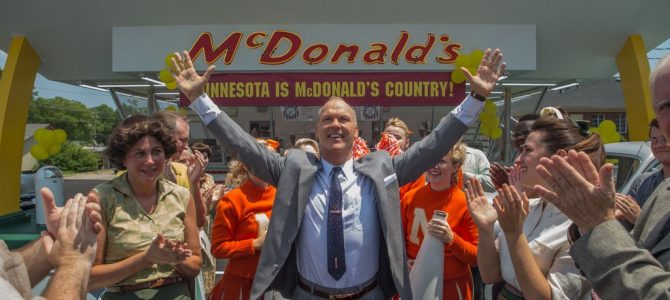
With as much hype as “La La Land” and “Moonlight” have attracted in the midst of awards season, you probably missed this under-promoted biopic. And that’s a shame: John Lee Hancock’s “The Founder” is one of the most engaging studies of capitalism and virtue since “The Big Short.”
“The Founder” tells the story of Ray Kroc (Michael Keaton), the businessman responsible for building the McDonald’s hamburger brand into a global empire. It’s a fascinating, stranger-than-fiction narrative that also works as a thought-provoking exploration of the tension between localism and entrepreneurialism.
How Ray Kroc Built The McDonald’s Franchise
The film starts in the 1950s, as a down-on-his-luck Kroc struggles to sell milkshake mixers to roadside restaurants. When a large mixer order comes through from an unknown burger joint in San Bernardino, California, Kroc decides to investigate things for himself. There he meets Mac and Dick McDonald (John Carroll Lynch and Nick Offerman, respectively), pioneers of an innovative kitchen management system that cuts down on wait times and doesn’t depend on washable dishes and cutlery. Quality control problems, however, have hampered their efforts to expand beyond a single restaurant.
Undeterred, Kroc convinces the McDonalds to give franchising another shot, and rapidly opens over a dozen sister restaurants across the American heartland. It quickly becomes clear, though, that Kroc’s national ambitions are a poor fit with the McDonalds’ family-based ideals… and Kroc is more than willing to fight dirty if it means retaining control of the massive corporation he’s trying to build. Through a series of conniving techniques, Kroc quickly emerges as the face of the McDonald’s Corporation, and goes on to serve “billions and billions” of hamburgers.
“The Founder” doesn’t depart much from its standard genre framework—an apparently decent man is seduced by money and power and ends up losing his moral compass—but it’s a compelling, artfully made peek into a little-discussed corner of history. And regardless of one’s feelings about McDonald’s cuisine in general, one has to admire the genius of the McDonalds’ restaurant design and Kroc’s insight into its industry-disrupting potential.
‘The Founder’ On Business Ethics and Greed
Whether intentionally or not, “The Founder” effectively sheds light on an ever-present tension in philosophical conservatives’ approach to economics. The American small-business dream—a family enterprise that becomes a national juggernaut through quality, perseverance, and character—is predicated on a logic of growth and expansion. That logic sometimes seems to change the essential character of the business: things can swiftly become less about community and place and more about dividends and cosmopolitanism. Once one starts making moral compromises, as “The Founder” warns, it may prove very difficult to arrest the downward slide.
“The Founder” does suffer somewhat from a melodramatic second half that swings for grandiosity and whiffs. In one extended scene, a beautiful temptress convinces Kroc to switch his milkshake recipe from real ice cream to powdered mix—a cost-cutting, quality-compromising decision that infuriates the McDonald brothers. Hancock dares to end the scene on a close-up shot of the new pseudo-milkshake, with its purveyor’s cleavage highlighted in the background. It’s a moment of supreme bathos: we’re talking about fast food here, not the travails of Sir Galahad.
Similarly, while Keaton originally channels the right blend of ambition, business acumen, and amorality, by the end of “The Founder” he’s become almost cartoonishly villainous. In one mordant scene, Kroc describes McDonald’s as a “new American church…feeding bodies and feeding souls.” He builds on this hauntingly consumerist vision by enshrining McDonald’s in the pantheon of civil religion, describing American iconography as a fusion of “crosses, flags…arches.”
There’s a fine line between delicious scene-chewing villainy and a bruising lack of subtlety, and unfortunately Keaton strays over that line a bit too often. Even moral monsters will display some redeeming qualities once in a while, but by the end of “The Founder,” Hancock has shifted into full denunciation of his protagonist. That denunciation isn’t undeserved: Kroc’s story is ruthless, a tale of profit-seeking run wildly amok.
How Chick-fil-A Has Avoided This Pitfall
But such a story need not necessarily be the norm. Perhaps the most interesting counterpoint is S. Truitt Cathy’s account of the rise of Chick-fil-A. To this day, Chick-fil-A carefully vets its franchisees—and employees—for their adherence to the company’s ethical values. As a result of this corporate culture, “good moral values” has moved from a methodological principle (“we do the right things, in the right way”) to an actual competitive advantage for the restaurant.
When I go to Chick-fil-A, I know I’m getting high-quality food, friendly employees, a spotless dining environment, and community reinvestment—and that in itself is a selling point, whether or not it was originally intended to be one. The lesson of Chick-fil-A is that a healthy business ethic ought to encompass not merely what one does (building a business through strategic decision-making) but also how that thing is done (not cutting corners, not breaching agreements, not destroying relationships to make more money, etc.). Character, in short, matters.
Despite its occasional storytelling mishaps, “The Founder” is well worth seeing, particularly for fans of rags-to-riches dramas: the narrative here is totally unique and virtually unknown outside trivia-buff circles. It’s also a quasi-Shakespearean look at the moral decay bred by unrestrained self-interest and the pursuit of money above all. If nothing else, you’ll never look at a McDonald’s hamburger the same way again: at one time, believe it or not, they were actually grilled on site and never frozen.
Alas, those days are long behind us. We live in Ray Kroc’s world now.









